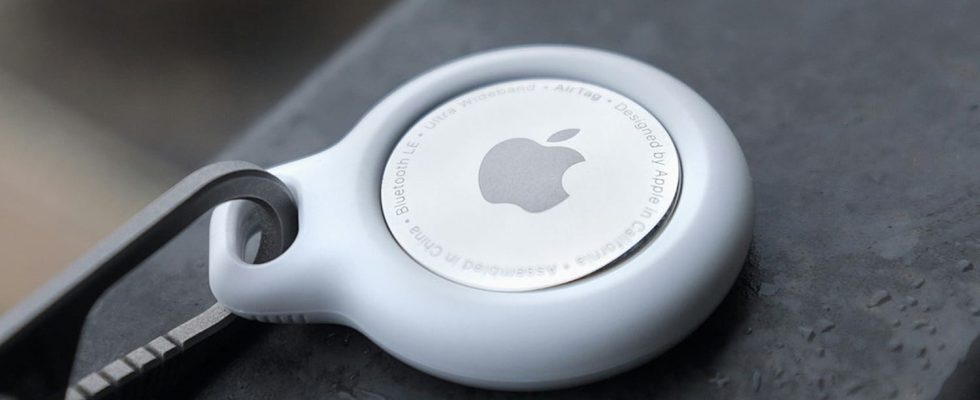Apple is being sued in California by three people because of its AirTag tracker. The reason: the small accessory is often misused by stalkers and other malicious people for spying purposes.
Apple AirTag has captured the hearts of consumers and has become very popular. This little box fits anywhere – on a set of keys, at the bottom of a bag, on a suitcase, in a pocket, in a wallet, under a two-wheeler saddle, in a car, etc. – and allows its owner to locate it precisely in just a few moments. Practical for finding your belongings in the event of loss or theft! But, as is often the case with technology, the gadget was quickly diverted from its initial use. And malicious people started using it for espionage purposes. It is enough to discreetly slip one into luggage or under a vehicle to track someone, without their knowledge. And always know where it is, by locating it on a smartphone in real time. A formidable technique for tracking a spouse suspected of infidelity, a teenager who skips school or even a competitor. Not to mention the thieves who spot rich potential victims in a train station, an airport or a parking lot before going to rob them at their home, the spurned lovers who cannot “bear” a separation or even the sexual predators who find a way there. easy to track their prey. Many cases of this type have been reported by the media all over the world since AirTags appeared on the market.
Last October, victims of harassment because of the AirTag filed a complaint against Apple, in the form of a class action. Dozens of people accused the Cupertino company of having caused them harm, through the misuse of its tracker, and of having been negligent in managing the risks of harassment potentially generated by its AirTags, under the California law. Obviously, the company denied any responsibility, asking the judge to dismiss the complaints. Ultimately, the San Francisco court allowed three plaintiffs to move forward with their lawsuits, as reported Bloomberg.
Spying by AirTag: protection measures considered insufficient
LaPrecia Sanders, an Indiana resident who is one of the plaintiffs, blames Apple’s AirTag for playing a decisive role in her son’s death. Not having tolerated the breakup, the latter’s ex-girlfriend followed him for hours, before running him over in a car as he was leaving a bar. One tragic example among many… “At a price of only $29, it has become the weapon of choice for harassers and attackers”, we can read in the complaint. Also, last Friday, California District Judge Vince Chhabria did not grant Apple’s request to dismiss the suit, finding that the three plaintiffs presented sufficient allegations of negligence and product liability to go to trial.
For its part, Apple highlighted its security measures for its AirTags that it subsequently introduced and the fact that it could not be held responsible in the event of misuse of the product. Indeed, in November 2022, Apple had deployed version 2.0.24 of the firmware – the internal software – of its tracking tags. So, the “Precise Location” feature helps to locate a detected unknown AirTag that is moving with the person. If her iPhone is on, a notification alerts her when an AirTag separated from its owner is traveling with her and emits a sound to indicate that it has been moved (see our article). Google followed suit at the end of 2023, by developing a similar function (see our article). But these measures do not completely solve the problem… The three plaintiffs allege that, when they were harassed, “the problems with the AirTag’s safety features were significant and these safety flaws caused their injuries”.
“Apple might be right that California law did not require it to do more to reduce the ability of harassers to effectively use AirTags, but that decision cannot be made at this early stage”, however, notes the judge. It is therefore not certain that the victims will win their case against Apple. Especially since the Apple brand and Google announced last year their collaboration to develop industrial standards aimed at proactively combating the misuse of these tracking devices. This new common specification will allow iOS and Android smartphones to automatically detect the famous unknown Bluetooth trackers. Most tracker manufacturers, namely Samsung, Tile, Chipolo, Eufy Security and Pebblebee, have joined the project. The objective is to ensure that all tags are detectable by all smartphones, regardless of their operating system (see our article). Hope this solves the problem once and for all…
